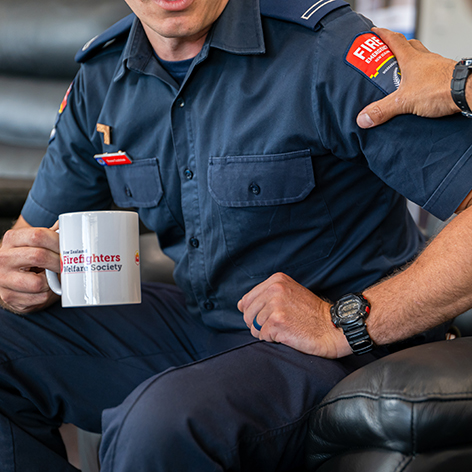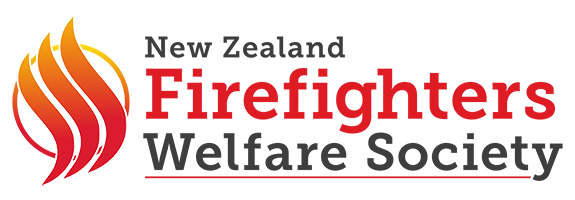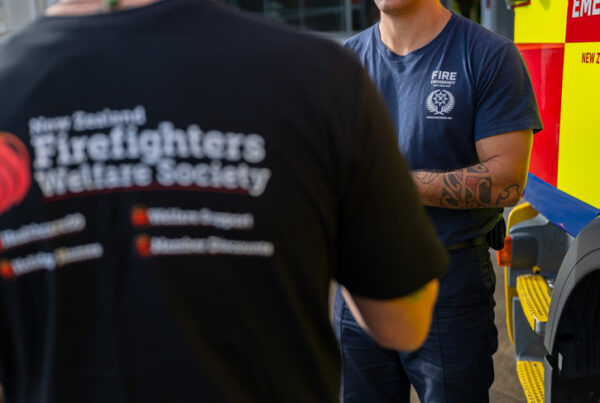
By Michelle Smith
For as long as I can remember, the fire service has been part of my DNA. Raised in the heart of the fire community by my mother, Lesina Walden, and my late father, Les Peters, I’ve spent a lifetime surrounded by those who run toward danger when others run away. My journey has come full circle, having officially joined the Mamaku Volunteer Fire Brigade in 2023 as Brigade Support. My third (and final) attempt at marriage brought me a firefighter husband—Justin Smith—whom I drag along to fire events. Thankfully, he takes it all in stride.
Despite being immersed in this world for over 40 years, I never truly understood the depth of support available through the fire service until our family faced an unimaginable crisis. We had joined the Firefighters Welfare Society a few years ago—honestly, initially lured in by the promise of holiday homes and member perks. Like many, we were looking for something that gave us value without much thought to the “why.” But that changed in 2022, when life threw us into a storm we couldn’t weather alone.
Everyone has a story of hardship. I’ve had my share—failed relationships, raising children from different partnerships, and all the ups and downs that come with modern family life. But 2022 brought a different kind of trial, the kind that tests every fibre of your being.
It began with my daughter, Bailey, who at ten years old started experiencing severe stomach pain. For two years, we were brushed off by doctors—tummy bugs, E. coli, food poisoning. But as a mother, you know when something is wrong. In 2022, we finally found a doctor who
listened. Bailey underwent every test imaginable—MRIs, CT scans, bloodwork, ECGs. Our lives became a blur of hospital visits and medical jargon, which, thanks to too many hours of Grey’s Anatomy, I could somewhat understand.
Eventually, Bailey was diagnosed with Severe Chronic Ulcerative Colitis, an incurable inflammatory bowel disease. Imagine the inside of your child’s bowel looking like it’s been scraped with a cheese grater. That’s what we were dealing with. It is amazing how much information you can learn in a short space of time when your child is involved. We began treatment, but within months, she was hospitalized with such unbearable pain that we spent three weeks in the paediatric ward in Rotorua. Then came the complication—pericarditis, fluid around the heart—sending us back to hospital again.
To make matters worse, I was also dealing with my own health issues and had to have my thyroid removed. Just two days after my surgery, Bailey was admitted again. That time was different. She was in too much pain to fight anymore. My little girl turned to me from her hospital bed and said, “Mum, I’m done, no more, I just want to die.” My little girl was giving up and it broke me. That was when the decision was made to transfer us to Starship. To add panic to the situation, the medical staff advised me to get her immediate family to come and say goodbye
because we were not sure when we would be back or if she was even coming back. Her Stepdad, Nan, sister and bio dad were given an exception pass to come in and say goodbye and we were transferred to Starship via helicopter.
Bailey collapsed at Starship Hospital after an accidental morphine overdose during transfer, I truly believed we might lose her. We were alone—just her and me in a hospital room lit by the Sky Tower—cut oƯ from visitors due to COVID protocols. My husband and family supported me as much as they could over the phone, but it was hard. I was exhausted and helpless. Long story short, we left the hospital on 30 pills a day, infusions once a month and a surgery option as the last resort.
After 3 weeks, Hubby and son picked us up from the hospital and drove us back to Rotorua but we were returned home to a house under renovation with no kitchen but there was a basket sitting on our table. It was from the Welfare Society. Inside was a message from Amanda, a Warehouse gift card for Bailey, and a few thoughtful items. That small gesture—unexpected and filled with care—broke through my emotional numbness. I went to my room and cried quietly while my family cooked dinner. It was the first time I felt like someone saw us. They couldn’t do anything to fix the issue, but they could do this, and it was exactly what I didn’t know I needed.
Everyone offers help, and they say to let them know if you need anything, they want to help and you want them to help, but you don’t know what you need or how they can help.
That basket wasn’t just a gift—it was a lifeline. The Society didn’t just stop there. They reimbursed our travel expenses, parking fees, and even offered us a weekend away in Taupo to recover. We didn’t take it, unable to leave our daughter, but the gesture mattered deeply.
Today, Bailey remains on medication and monthly infusions. She hasn’t attended school in three years and is immunosuppressed. But we’ve adapted to our new normal, and thanks to the Society, we’ve felt supported every step of the way.
This experience changed how I see the Welfare Society. It’s not about perks or discounts. It’s about community. It’s about knowing that when life knocks you down, someone is there to help you back up—even if you’ve never met them. The Society gave us what we didn’t even know we needed.
So, as you read this—whether you’re a firefighter, a partner, or support crew—ask yourself: Do our families have the support they need when things fall apart? For $12 a fortnight, they can. Not just through tangible benefits, but through the silent promise that someone’s got your back.
To all the members of the Firefighters Welfare Society—thank you. You might never know the full impact of your contribution, but I do. Because of you, my family had the strength to get through the worst year of our lives.
In this line of work, we don’t always see the results of our actions. Sometimes the people we help never know our names. But we do it anyway. That’s the spirit of firefighting—selfless, relentless, and grounded in service. And that is exactly what the Welfare Society stands for, Firefighters helping firefighters.

